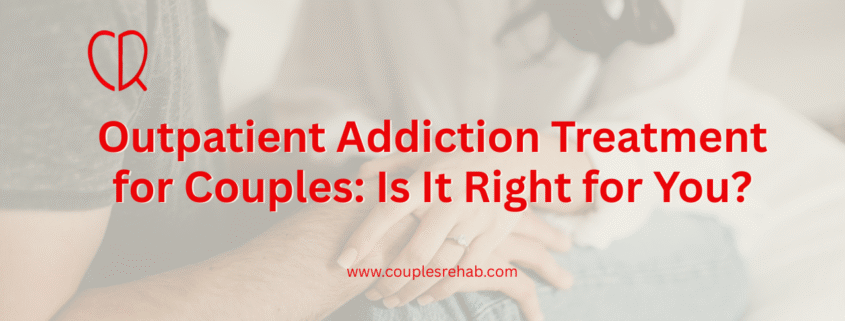When Lisa and Jack first walked into our offices, they carried the weight of years of addiction struggles that had nearly torn their marriage apart. Like many couples facing substance abuse challenges, they wondered if there was hope for recovery without completely disrupting their family life and careers. Six months later, they celebrated their first anniversary of sobriety together – a milestone they achieved through outpatient addiction treatment for couples. Outpatient addiction treatment for couples offers a path to recovery that allows partners to heal together while maintaining their daily responsibilities. This comprehensive approach addresses both individual addiction issues and relationship dynamics, making it an effective option for many couples ready to rebuild their lives and strengthen their bond in sobriety.
What Is Outpatient Addiction Treatment for Couples?
Outpatient addiction treatment for couples represents a specialized approach that recognizes addiction doesn’t happen in isolation – it affects entire relationships. Unlike traditional individual treatment, this method addresses both partners simultaneously, whether one or both struggle with substance abuse.
This treatment model allows couples to live at home while attending structured therapy sessions throughout the week. Couples participate in individual counseling, joint therapy sessions, and group support meetings designed specifically for partners navigating recovery together. The flexibility of outpatient care means you can maintain work schedules, family responsibilities, and daily routines while receiving comprehensive addiction treatment.
The foundation of couples-focused outpatient treatment rests on evidence-based therapies like Behavioral Couples Therapy (BCT) and family systems approaches. These methodologies understand that relationship dynamics often contribute to addiction patterns and that healing the partnership becomes crucial for long-term recovery success.
Understanding the Benefits of Outpatient Therapy for Married Couples
The benefits of outpatient addiction therapy for married couples extend far beyond individual sobriety. When partners recover together, they create a shared foundation of understanding, accountability, and mutual support that significantly enhances treatment outcomes.
Maintaining Family Stability: One of the most significant advantages involves keeping families intact during treatment. Parents can continue caring for their children while receiving help, eliminating the disruption that residential treatment might cause. This continuity proves especially valuable for couples with young children who need consistent parental presence.
Financial Accessibility: Outpatient programs typically cost significantly less than residential treatment options, making recovery more accessible for families facing financial constraints. Many insurance plans provide better coverage for outpatient services, and the ability to continue working helps maintain household income during treatment.
Real-World Application: Learning recovery skills in your actual environment – your home, community, and daily routine – provides immediate opportunities to practice new coping strategies. Couples can apply communication techniques learned in therapy to their everyday interactions, reinforcing healthy patterns more effectively than in artificial treatment settings.
Strengthened Partnership: When both partners commit to recovery, they develop shared goals and experiences that can actually strengthen their relationship. Many couples report feeling closer and more connected after completing outpatient treatment together, having worked through challenges as a team.
Flexible Scheduling: Outpatient programs accommodate various schedules, offering evening and weekend options that work around employment and family obligations. This flexibility removes common barriers that prevent couples from seeking help.
Signs That Outpatient Rehab May Be Effective for Both Partners
Determining whether outpatient treatment represents the right choice requires honest assessment of several key factors. Not every couple benefits equally from this approach, and understanding when it works best helps ensure successful outcomes.
Motivation and Commitment: Both partners must demonstrate genuine desire for recovery. When one person participates reluctantly or primarily to appease their partner, outpatient treatment becomes significantly less effective. Success requires active engagement from both individuals.
Stable Living Environment: Couples need a supportive home environment free from substances and triggers that might undermine recovery efforts. If the home remains filled with alcohol or drugs, or if destructive relationship patterns dominate daily interactions, outpatient treatment may prove insufficient.
Absence of Severe Withdrawal Risks: Partners experiencing mild to moderate withdrawal symptoms typically manage well in outpatient settings. However, those facing severe physical dependence requiring medical detoxification may need inpatient care initially before transitioning to outpatient services.
Basic Relationship Foundation: While relationships may be strained, couples benefit most from outpatient treatment when they maintain some level of love, respect, and commitment to their partnership. Relationships characterized by ongoing abuse, violence, or complete breakdown may require individual treatment first.
Employment and Social Stability: Having work, housing, and basic social support systems in place provides the stability necessary for outpatient treatment success. Couples experiencing homelessness or complete social isolation may need more intensive intervention.
Previous Treatment History: For couples who have attempted recovery before, outpatient treatment can be effective if previous efforts provided some foundation of recovery skills, even if relapse occurred. However, multiple failed attempts may indicate the need for more intensive care.
Types of Outpatient Programs Available for Couples
Intensive Outpatient Programs (IOPs)
Intensive outpatient programs for addicted couples represent the most structured form of outpatient care, typically requiring 9-20 hours of treatment per week. These affordable intensive outpatient programs for addicted couples provide comprehensive services while allowing participants to maintain their living arrangements.
IOPs usually involve three to four sessions weekly, each lasting three to four hours. Couples participate in both joint and individual therapy sessions, educational groups about addiction and recovery, and peer support meetings with other couples facing similar challenges. The intensity provides significant support during early recovery while maintaining flexibility for family and work commitments.
Behavioral Couples Therapy Sessions
Behavioral couples therapy for addiction in an outpatient setting focuses specifically on relationship dynamics that contribute to substance abuse patterns. This evidence-based approach helps couples identify triggers, develop healthy communication skills, and create accountability systems that support ongoing recovery.
Sessions typically occur weekly and combine individual assessment with joint therapy time. Couples learn specific techniques for managing cravings together, handling stress without substances, and rebuilding trust damaged by addiction. Many programs incorporate homework assignments that encourage couples to practice new skills between sessions.
Online Couples Addiction Counseling Options
The expansion of telehealth services has made online couples addiction counseling options increasingly accessible. Virtual platforms allow couples to participate in therapy from home, removing transportation barriers and providing scheduling flexibility that traditional in-person sessions might not offer.
Online programs maintain the same therapeutic structure as in-person treatment but offer additional privacy and convenience. Couples can access support groups, educational resources, and individual counseling through secure platforms designed specifically for addiction treatment. This format works particularly well for couples in rural areas or those with limited transportation options.
Comparing Inpatient vs. Outpatient Addiction Treatment for Partners
The decision between inpatient and outpatient care depends on several critical factors that couples must carefully evaluate with professional guidance.
Severity of Addiction: Couples dealing with severe, long-term addiction or those experiencing dangerous withdrawal symptoms typically require inpatient care initially. Outpatient treatment works best for those with mild to moderate substance abuse issues or as a step-down from residential care.
Family Responsibilities: Parents with young children often find outpatient treatment more practical, as it doesn’t require family separation. However, if children have been exposed to neglect or unsafe conditions due to parents’ substance abuse, temporary inpatient care might be necessary to ensure everyone’s safety.
Financial Considerations: Outpatient programs cost significantly less than residential treatment, but insurance coverage varies widely. Some couples discover that their insurance actually covers residential care more comprehensively, making inpatient treatment the more affordable option despite higher initial costs.
Support System Strength: Couples with strong family support and stable home environments often succeed in outpatient programs. Those lacking external support or living in environments that enable substance abuse typically need the controlled setting that inpatient treatment provides.
Previous Treatment Experience: Couples who have completed residential treatment but experienced relapse might benefit from outpatient programs as continuing care. Conversely, those new to treatment with severe addiction issues may need the intensive intervention that only inpatient care can provide.
Medical Complexity: Partners with co-occurring mental health disorders, serious medical conditions, or complex medication needs often require the 24-hour medical supervision available in inpatient settings.

Support Systems: Groups and Community Resources
Support groups for couples in outpatient addiction recovery provide essential peer connections that extend beyond formal therapy sessions. These groups create communities where couples can share experiences, celebrate milestones, and receive encouragement from others who understand their unique challenges.
Couples-Specific Support Groups: Many communities offer support groups designed specifically for couples in recovery. These meetings focus on relationship issues, communication skills, and strategies for maintaining sobriety together. Participants often develop lasting friendships and accountability partnerships that continue long after treatment ends.
Traditional Support Groups with Couple Participation: Programs like Alcoholics Anonymous and Narcotics Anonymous welcome couples who attend meetings together. While these groups don’t focus specifically on relationship issues, they provide valuable peer support and proven recovery frameworks that benefit couples.
Online Support Communities: Digital platforms offer 24/7 access to peer support through forums, chat groups, and virtual meetings. These resources prove particularly valuable for couples in areas with limited local support options or those seeking additional connection beyond in-person meetings.
Faith-Based Recovery Groups: Many couples find strength in religiously-oriented recovery programs that incorporate spiritual principles into addiction treatment. These groups often provide additional community support through church congregations and faith-based recovery networks.
Recreational and Social Activities: Recovery communities frequently organize substance-free social events, recreational activities, and family gatherings that help couples build new social networks centered around healthy activities rather than substance use.
Special Considerations for Couples with Children
Outpatient addiction treatment for couples with children requires careful planning to ensure both effective treatment and child welfare. Parents must balance their recovery needs with their children’s emotional and physical safety.
Childcare During Sessions: Many outpatient programs provide on-site childcare or can recommend reliable services that support families during treatment hours. Some programs schedule sessions during school hours to minimize childcare needs, while others offer evening and weekend options when older children can help with younger siblings.
Age-Appropriate Family Involvement: Treatment plans often include family therapy sessions designed for different age groups. Young children might participate in play therapy that helps them understand and process their parents’ recovery journey, while teenagers may benefit from educational groups about addiction and family dynamics.
Safety Planning: Treatment providers work with parents to develop safety plans that protect children throughout the recovery process. This includes identifying warning signs of relapse, creating emergency contacts for childcare, and establishing protocols for maintaining child safety during potential crises.
Educational Support: Children of parents in recovery often benefit from school-based counseling services and support groups for families affected by addiction. Treatment programs frequently coordinate with school counselors to ensure children receive appropriate support in all environments.
Legal Considerations: Families involved with child protective services require specialized treatment approaches that address legal requirements while supporting family reunification goals. Treatment providers often work directly with social workers and court systems to ensure compliance with legal mandates.
How to Choose the Best Outpatient Addiction Program for Couples
Selecting the right outpatient program requires careful research and consideration of multiple factors that affect treatment success and family well-being.
Accreditation and Licensing: Verify that programs hold proper state licensing and national accreditation from organizations like the Commission on Accreditation of Rehabilitation Facilities (CARF) or the Joint Commission. These credentials ensure that programs meet established quality and safety standards.
Staff Qualifications: Look for programs staffed by licensed addiction counselors, marriage and family therapists, and medical professionals with specific training in couples addiction treatment. Staff should hold relevant certifications and demonstrate experience working with relationship dynamics in recovery.
Treatment Philosophy and Approach: Different programs emphasize various treatment methodologies. Some focus heavily on 12-step principles, while others prioritize cognitive-behavioral therapy or family systems approaches. Choose programs whose philosophy aligns with your values and treatment preferences.
Program Structure and Flexibility: Consider whether program schedules accommodate your work and family obligations. Some programs offer morning, afternoon, or evening sessions, while others provide weekend options. Flexibility in scheduling often determines treatment accessibility for working couples.
Insurance Coverage and Cost: Contact your insurance provider to understand coverage details before selecting a program. Many insurers have preferred provider networks that significantly reduce out-of-pocket costs. Also inquire about payment plans or sliding scale fees for services not covered by insurance.
Location and Transportation: Choose programs accessible by reliable transportation, considering factors like public transit availability, parking costs, and travel time from home and work. Location accessibility affects treatment attendance and long-term participation.
Continuing Care and Aftercare Services: Effective programs provide robust aftercare planning that includes ongoing therapy options, support group referrals, and relapse prevention resources. Recovery extends beyond formal treatment, so programs should support long-term success.
Cost and Insurance: Making Treatment Affordable
Understanding the financial aspects of outpatient couples addiction treatment helps families plan effectively and access needed services without overwhelming financial stress.
Insurance Coverage Basics: Most major insurance plans include substance abuse treatment benefits under mental health parity laws. However, coverage varies significantly between plans, with some covering 100% of outpatient services while others require substantial co-pays or deductibles.
In-Network vs. Out-of-Network Providers: Using in-network providers typically reduces costs dramatically. Contact your insurance company for preferred provider lists and verify that couples treatment specifically falls under covered services, as some plans limit benefits to individual treatment only.
Government-Funded Programs: State and federal funding supports many outpatient addiction programs, particularly for families meeting income requirements. These programs often provide services at reduced costs or on sliding scale fee structures based on family income.
Employee Assistance Programs: Many employers offer Employee Assistance Programs (EAPs) that provide free or discounted addiction treatment services. These programs often include several counseling sessions at no cost and can refer families to additional resources.
Payment Plans and Financing Options: Most treatment programs offer payment plans that spread costs over several months, making treatment more manageable for families on tight budgets. Some programs also accept CareCredit or other medical financing options that provide low-interest payment plans.
Cost-Benefit Analysis: While outpatient treatment requires financial investment, consider the costs of continued addiction – lost wages, legal problems, medical expenses, and relationship damage often far exceed treatment costs. Many families discover that treatment actually saves money in the long term.
Success Stories and What to Expect
Understanding realistic expectations helps couples prepare mentally and emotionally for the recovery journey ahead. While every couple’s experience differs, common patterns emerge among those who achieve lasting sobriety together.
Early Treatment Phase (Weeks 1-4): Initial weeks often feel overwhelming as couples adjust to treatment schedules, learn new communication skills, and begin addressing underlying issues. It’s normal to experience emotional ups and downs as old patterns change and new habits develop.
Building Momentum (Weeks 5-12): Most couples report increased comfort with the treatment process and begin seeing positive changes in their relationship dynamics. Communication improves, trust begins rebuilding, and couples develop stronger coping skills for managing triggers and stress.
Integration and Growth (Weeks 13-24): Longer-term participants typically experience significant transformation in both individual sobriety and relationship satisfaction. Couples often report feeling closer than they have in years, with shared recovery goals creating new intimacy and partnership strength.
Realistic Challenges: Recovery isn’t linear, and couples should expect setbacks along the way. Disagreements about treatment approaches, different recovery paces, and external stressors can create tension. However, couples who persist through challenges often emerge stronger and more resilient.
Long-Term Outcomes: Research indicates that couples who complete outpatient treatment together maintain higher sobriety rates than those who attempt recovery individually. The mutual accountability and shared commitment to recovery create protective factors that support long-term success.
Relationship Transformation: Many couples describe their post-treatment relationship as fundamentally different and healthier than before addiction became problematic. They report better communication, increased intimacy, and stronger problem-solving skills that benefit all aspects of their partnership.
Frequently Asked Questions
1. Can couples attend outpatient treatment if only one partner has an addiction?
Yes, absolutely. Many outpatient programs welcome couples where only one partner struggles with substance abuse. The non-addicted partner learns support strategies, communication skills, and how to avoid enabling behaviors while the addicted partner receives direct treatment.
2. How long does outpatient couples addiction treatment typically last?
Treatment duration varies based on individual needs, but most programs recommend 90 days minimum, with many couples participating for 6-12 months. The flexible nature of outpatient care allows couples to continue treatment as long as beneficial.
3. What happens if one partner relapses during outpatient treatment?
Relapse doesn’t mean treatment failure. Programs include relapse prevention planning and immediate intervention protocols. The couple may need to adjust their treatment plan, possibly increasing session frequency or considering more intensive care temporarily.
4. Do couples attend all therapy sessions together?
Most programs combine individual and joint sessions. Partners receive individual counseling to address personal issues while participating in couples therapy to work on relationship dynamics. The specific balance depends on each couple’s needs.
5. Can couples bring their children to treatment sessions?
Many programs provide childcare services or family-friendly scheduling options. Some treatment facilities offer specific family therapy sessions that include children, while others maintain adult-only therapeutic spaces.
6. How do outpatient programs handle domestic violence concerns?
Safety always takes priority. Programs screen for domestic violence and may recommend individual treatment first if safety concerns exist. Couples therapy proceeds only when both partners can participate safely without fear of retaliation.
7. What types of addiction do couples outpatient programs treat?
Most programs treat all substance addictions including alcohol, prescription drugs, illegal drugs, and behavioral addictions. Some programs specialize in specific substances, while others provide comprehensive addiction treatment services.
8. Will insurance cover couples addiction treatment?
Many insurance plans cover outpatient addiction treatment, including couples therapy components. Coverage varies by provider and plan, so it’s essential to verify benefits before beginning treatment. Many programs assist with insurance verification.
9. Can couples continue working while in outpatient treatment?
Yes, maintaining employment is often encouraged as part of recovery. Programs schedule sessions around work commitments, offering evening and weekend options. Some employers also provide accommodations for treatment attendance.
10. How do couples find qualified outpatient addiction treatment programs?
Start by contacting your insurance provider for in-network options, consulting with your primary care doctor for referrals, or using online directories from organizations like SAMHSA. Look for programs specifically advertising couples treatment services and verify staff credentials.
Taking the Next Step with Couples Rehab
Recovery represents a journey of hope, healing, and renewed partnership. If you and your partner are struggling with addiction, know that effective help is available and that thousands of couples have successfully rebuilt their lives together through outpatient treatment.
The decision to seek treatment together demonstrates tremendous courage and commitment to your relationship. While the path ahead may seem challenging, the rewards of recovery – renewed intimacy, restored trust, and shared sobriety – make the effort worthwhile.
At Couples Rehab, we understand the unique challenges that addiction creates for relationships, and we’re dedicated to providing the specialized care that couples need to heal together. Our comprehensive outpatient programs combine evidence-based addiction treatment with relationship counseling, creating the foundation for both individual recovery and partnership renewal.
Ready to Begin Your Recovery Journey Together? Don’t let addiction continue damaging your relationship and family. Take the first step toward healing by contacting Couples Rehab today. Our compassionate admissions team is available 24/7 to answer your questions, verify insurance benefits, and help you determine if our outpatient program is right for your unique situation.
Recovery is possible. Healing is available. Your relationship can be restored. Let Couples Rehab guide you toward the life you deserve – together.




